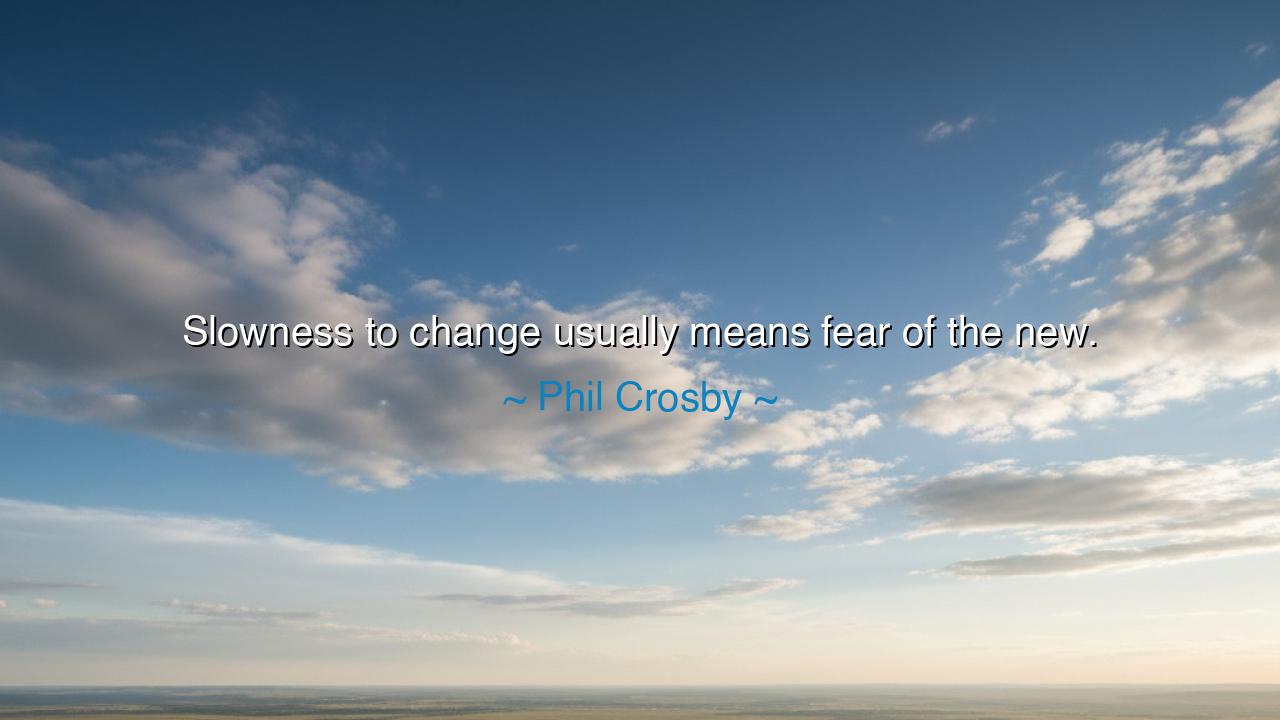
Slowness to change usually means fear of the new.






Opening Scene
The evening sun casts a warm, golden glow through the office window, stretching long shadows across the room. The soft murmur of the city below feels distant, as though the world outside is moving at a different pace. Jack and Jeeny sit across from each other, the clutter of papers and files scattered between them. The air in the room feels charged, a subtle tension building as they sift through ideas, trying to unpack a larger truth. The clock ticks steadily, but time itself feels like it’s slowing down in the quiet of their conversation.
Host: The room feels a bit too small now, as though the words they are about to exchange will change the space between them. The light from the window flickers with the fading daylight, casting a soft reflection on the glass of their coffee cups. There’s a tension in the air — not the kind that divides, but the kind that makes you pause, think, and wonder.
Jeeny: (looking up from the paper in front of her, her voice soft but firm) “You know, I was thinking about something Phil Crosby said: ‘Slowness to change usually means fear of the new.’ Doesn’t that hit a little close to home?”
Jack: (glancing up from his papers, a hint of skepticism in his voice) “Fear of the new? Change is just hard. It’s not always fear, it’s just… discomfort. People don’t like stepping out of their comfort zone. But that doesn’t mean it’s all fear.”
Jeeny: (nodding, her voice calm) “But maybe that discomfort is rooted in fear, Jack. Fear of the unknown, fear of failure, fear of what will happen if you take that first step into something unfamiliar. Change always feels uncertain, but it’s in that uncertainty where growth happens.”
Host: The silence in the room deepens as Jeeny’s words hang in the air. Jack leans back in his chair, staring at the wall for a moment as the weight of what she’s said begins to settle. The soft tick of the clock becomes louder, more pronounced, almost like the beat of a heart in a room filled with stillness.
Jack: (finally breaking the silence, his voice thoughtful) “I get what you’re saying, but change isn’t always the best option, right? Sometimes people are slow to change because they see the risks. Maybe it’s not about fear, but about being cautious, about understanding the consequences of moving too fast.”
Jeeny: (smiling slightly, her voice reassuring) “Being cautious isn’t the same as resisting change, Jack. The real danger comes when we resist it out of fear. It’s natural to be hesitant about change, but sometimes that hesitation becomes paralysis, and we miss out on opportunities. Fear keeps us stuck, and the longer we stay stuck, the harder it is to move forward.”
Host: The room feels smaller now, the energy between them becoming a tangible force. Jeeny’s words seem to resonate in the stillness of the moment, while Jack’s gaze softens, his mind working through the tension between caution and change. The light in the room has dimmed slightly, but it feels warmer now, as though the conversation has sparked something within them both.
Jack: (after a moment, his voice gentler) “Maybe I’ve been too focused on the risks, and not enough on the opportunities. It’s easy to fear what we don’t understand, but maybe that’s what holds us back from what we could become.”
Jeeny: (nodding, her smile warm) “Exactly. And it’s not about rushing into change blindly. It’s about being willing to step into the unknown, to make the choice to grow, even when it feels uncomfortable. The fear is always going to be there, but the key is to not let it control us.”
Host: The room feels more open now, as if the conversation itself has shifted the air around them. The stillness of the space is no longer oppressive, but full of possibility, like the calm before a storm — the kind that is invigorating, not overwhelming. Jack’s posture softens, and for the first time, there’s a sense of peace in his expression.
Jack: (with a soft chuckle, his voice almost light) “I guess that’s the paradox, isn’t it? The fear of change is what keeps us from growing, but it’s also what pushes us forward. We can’t have progress without it, can we?”
Jeeny: (smiling warmly, her voice affirming) “No, we can’t. Change is scary, but it’s the only thing that moves us forward. It’s what helps us adapt, become better versions of ourselves. So yes, fear is part of the process, but it doesn’t have to hold us back. The key is to move through it, not around it.”
Host: The light from the window fades into twilight, and with it, the sense of clarity between them settles in. The storm of thoughts and fears that once felt so heavy now seems like a breeze, passing through the room, leaving behind the quiet peace of understanding. Jack and Jeeny sit in the stillness of the evening, knowing that true change is not about avoiding discomfort, but about stepping through it and into something better.
Jack: (softly, with a small smile) “I think I’m starting to get it. Change doesn’t happen without fear, but it’s the fear that makes it worth it.”
Jeeny: (smiling, her voice gentle) “Exactly, Jack. Progress doesn’t happen without stepping out of our comfort zone. And sometimes, that’s exactly where the magic is.”
Host: The evening settles in around them, the world outside continuing its rhythm, but inside, Jack and Jeeny sit together, quiet in the shared realization that change is not something to fear, but something to embrace — a force that shapes who we are and what we become.






AAdministratorAdministrator
Welcome, honored guests. Please leave a comment, we will respond soon